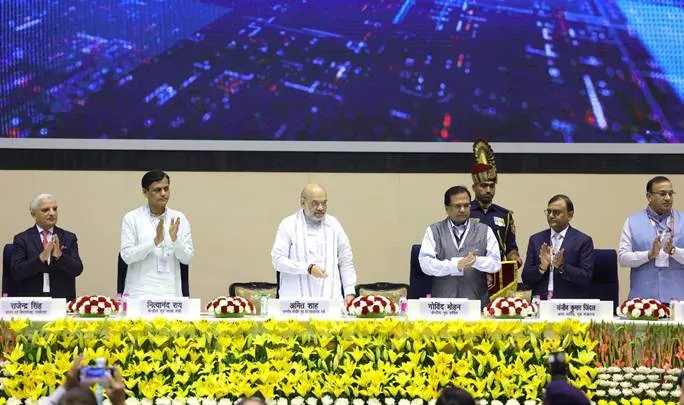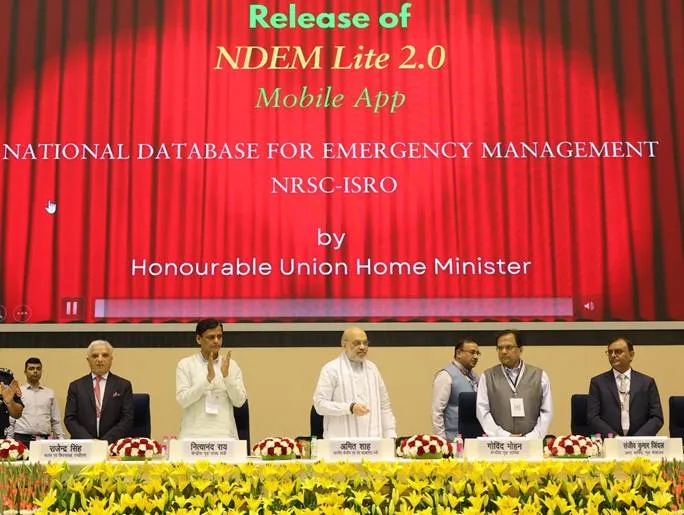HM Amit Shah addresses annual conference of Relief Commissioners and Disaster Response Forces








New Delhi, June 16
Union Home Minister Amit Shah addressed the annual conference of Relief Commissioners and Disaster Response Forces of States and Union Territories in New Delhi today as the chief guest.
On this occasion, Minister of State for Home Affairs, Nityanand Rai, Union Home Secretary Govind Mohan, and several other dignitaries were present.
In his address, Union Home Minister Amit Shah stated that over the past two years, workshops of all agencies related to relief and disaster management have been brought under one platform, adopting a 'Whole of Government' approach to create a think tank to work in a unified manner. He said this has helped address shortcomings and prepare the entire country to fight the disasters. Additionally, a multi-stakeholder approach and inter-agency coordination have been effectively achieved. He emphasized that this tradition should be further strengthened.
Shah said that due to climate change and global warming, the entire world is grappling with disasters.
He said that in the past 10 years, because of the contributions of the National Disaster Management Authority (NDMA), the National Disaster Response Force (NDRF), and the Coalition for Disaster Resilient Infrastructure (CDRI), India is moving towards becoming a global leader in the field of disaster management. He highlighted that NDMA has done commendable work in policy frameworks, research, disseminating various training materials, developing apps, and overall coordination. He added that NDRF has earned nationwide recognition, built a strong reputation, and gained respect.
The State Disaster Response Force (SDRF) has also played a significant role in this structure. Shah mentioned that NDRF has done substantial work in training SDRF personnel at par with its own standards.
Union Home Minister said that whenever the history of India’s disaster response is written, these 10 years of the Modi government will be recorded as a transformative decade. He said that in the past 10 years, Modi government has achieved significant milestones in the four areas of capacity building, speed, efficiency, and accuracy in disaster management. He said, not only has our capacity to handle disasters been increased, but it has also been enhanced and extended to the tehsil level. Attention has been given to speed, as saving lives during a disaster is of utmost importance.
Shah noted that efficiency has been improved through the use of cutting-edge technology and the dedicated approach of disaster response forces. Additionally, by providing accurate forecasting and early warnings, society has been made aware and successfully engaged in relief and rescue operations.
Shah said that during the Modi government’s tenure, there has been a significant shift in the approach related to disaster management. Earlier, the approach was relief-centric, but today, the goal of 'zero casualty' has been successfully achieved, and the focus has shifted from relief-centric to a comprehensive and integrated approach. He emphasized the importance of anticipating future disasters, conducting advance research, compiling global ideas in this field, and adapting them to suit India’s geographical conditions. Shri
Shah noted that the Modi government has transformed efforts from reactive to proactive and increased public participation. Now, the central government, state governments, and local units are coming together in an integrated manner to tackle disasters. He added that under Prime Minister Modi’s leadership, efforts to involve society have also been successfully undertaken. In the next 10 years, every young person in the country will be prepared to fight disasters with a spirit of service.
India has achieved a great deal in the development of early warning systems. Timely preparedness has been integrated with the calendar, a scientific approach has been evolved for active prevention and mitigation, and we have also achieved significant success in disaster risk reduction. He said that by pursuing the goal of 'Minimum Casualty', the Modi government has amazed the entire world by achieving the target of 'Zero Casualty' in 10 years.
He said that in 1999, a super cyclone hit Odisha in which 10,000 people lost their lives, whereas in 2019, during Cyclone Fani in Odisha, only one person died. Later, during Cyclone Biparjoy in Gujarat, there were zero casualties—not even a single animal died.
He said this demonstrates that if local units, the public, the state, the Centre, all departments, scientists, and security personnel work together, great achievements can be attained. Shri Shah said that in the last decade, we have made significant efforts for financial empowerment and greatly increased the government’s budget. We have also pursued institutional empowerment deliberately and by design, along with structural empowerment. Combining all these, we have also adopted a multidimensional approach as a policy.
HM Amit Shah said that from 2004 to 2014, the budget of the SDRF was Rs. 38,000 crore, which increased to Rs. 1.44 lakh crore from 2014 to 2024. Similarly, the budget of the NDRF was Rs. 28,000 crore from 2004 to 2014, which Prime Minister Modi increased to Rs. 84,000 crore today. Overall, we have nearly tripled the total budget from Rs. 66,000 crore to Rs. 2 lakh crore. Shri Shah said that this financial empowerment has been highly successful in bringing all our efforts to the village level. He said that in the 15th Finance Commission, compared to the 14th Commission, we have increased the budget fourfold. For the first time, we have also created a National Disaster Risk Management Fund at the national level with Rs. 68,000 crore.